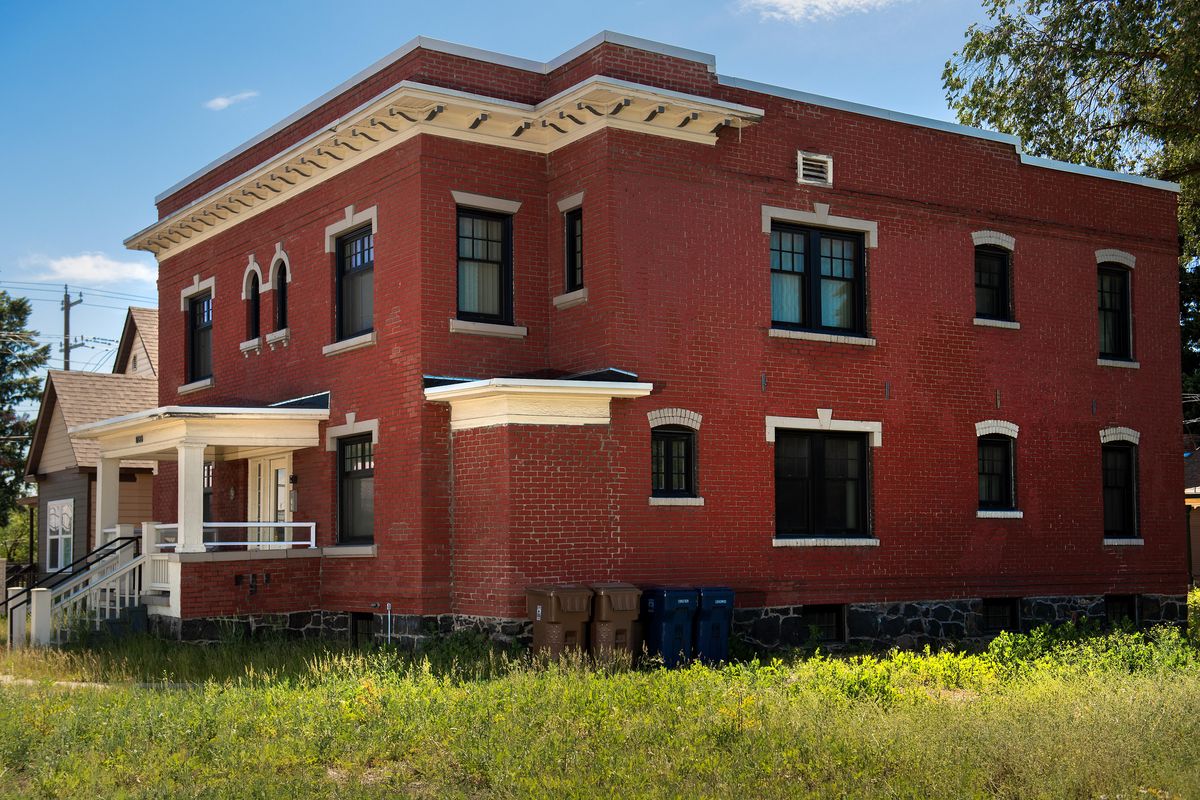East Central group working to transplant historic Rose Apartments from I-90’s edge to save it from freeway expansion

After more than a century on Third Avenue, the historic Rose Apartments could soon be moved to a new home.
The Rose Apartments faces Interstate 90 on Third Avenue and is in the path of the North South Corridor freeway project. The new location, which is also owned by the East Central Community Organization, is currently a community garden about a block away.
Chris Venne, president of the ECCO board of directors, said he hopes the organization will work out a deal with the Department of Transportation, and begin moving the apartments by the end of the year, but doesn’t know when they’ll reopen.
“The neighborhood has lost so many affordable housing units to the freeway expansion,” he said. “We just want to make sure that these aren’t among them.”
The apartments, 1726 E. Third Ave., were built in 1910 by stonemason Michael Hunz and named after Hunz’s daughter, Rose, who would have been a teenager at the time.
The Rose Apartments were also built as Spokane experienced it biggest population boom, and there was a housing shortage, according to the city’s historic preservation office. East Central was one of Spokane’s early working-class neighborhoods outside the core, and the Rose, which originally had four much larger apartments, was one of the few multifamily complexes in the early days of Spokane.
Since the Rose Apartments were built, they’ve had several names including the Kly Apartments and the Cecil Apartments, before falling into disrepair. In 2010, the city worked with the ECCO to purchase and completely remodel the interior of the building. It now has eight apartments. A small, one-bedroom house is on the apartment’s property in the backyard.
The Rose Apartments has been an East Central landmark for over a century and is one of the few affordable apartment options left in East Central, said Jerry Numbers, a former ECCO board member involved with the project.
Numbers said hundreds of East Central homes have been moved and demolished and the apartments that have been built to replace them, especially toward the Perry District, aren’t as affordable for East Central’s low-income residents. He said replanting the Rose Apartments in East Central is one way to preserve the neighborhood’s character, and a few units of affordable housing.
“The neighborhood has been really decimated by the freeway,” he said.
Venne said he hopes the Department of Transportation will buy the Rose Apartments and the land they sit on, and sell the building back to the ECCO for the minimum allowable bid of $10, but they are still in negotiations. He hopes the money from the purchase, and other financial assistance from the Department of Transportation, will cover the cost of moving the building.
Melinda Ziemann, relocation supervisor for the eastern region of WSDOT, said the Department of Transportation is working toward a deal where ECCO would be the only bidder on the Rose Apartments, and pay only the minimum bid to buy the building back, Ziemann said.
“Because it’s low-income housing, we really want to make this happen,” she said.
The Rose is one of 12 historic properties WSDOT has auctioned to purchasers willing to move them within the East Central neighborhood. Two of the historic properties were demolished because no one bid on them, and nine were purchased and moved elsewhere in East Central.
Ziemann said four of the Rose’s nine units still are occupied. She said one apartment was vacant when the Department of Transportation began relocating residences, and four tenants have moved out and received relocation assistance. She said even if WSDOT purchased the property tomorrow, residents would have at least three months to move.
Venne said ECCO still is working with an architect to determine how much moving the building would cost, but they estimate it could be more than $500,000 to separate the building from its foundation, move it and attach it to a new foundation. Venne said more than $1 million was invested in the apartments when they were remodeled in 2010, and replacing them would be far more expensive than moving them.
ECCO also plans to move just the Rose Apartments, and not the small house in the back, and may build an apartment in the basement to keep the same number of units, Venne said. To move the apartments, the nonprofit plans to contract with a Canadian-based house moving company, the Nickel Bros. The company has previously moved a mansion from Seattle’s Madison Park neighborhood across the Puget Sound to Bainbridge Island.
“Hundreds of affordable houses are gone in the neighborhood and affordable housing is a crisis in our community,” he said. “It would take years and millions and millions of dollars to replace that asset. We’re just hoping and working really hard to say this building can be saved.”